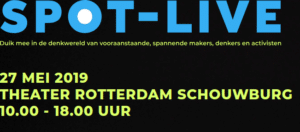‘We staan aan de vooravond van een nieuwe culturele revolutie. We moeten weg uit ons paradigma en kunst kan daar een rol in spelen. De kunst kan ons beelden tonen van een andere toekomst, een andere gedachte. Kunstenaars kunnen helpen om dat besef in te laten dalen.’
Aan het woord is schrijver en journalist Philipp Blom. In 2017 kwam zijn boek ‘Wat op het spel staat’ uit, een briljant geschreven en in één adem uit te lezen beschrijving van waar het fout gaat in de wereld, met toch nog een optimistisch slothoofdstuk. Inmiddels is het een wereldwijde bestseller. En terecht.
Toekijken
Blom is – met Gloria Wekker en Eric De Vroedt – curator van het vernieuwde congres podiumkunsten, dat onder de naam SPOT-Live op 27 mei in Rotterdam wordt gehouden. Wat heeft deze schrijver, die in zijn werk de kwalijke gevolgen van klimaatverandering, digitalisering en de vrije markt als bijna onomkeerbaar beschrijft, te bieden aan mensen in de podiumkunst? Aan de telefoon vanuit Wenen verklaart de auteur, die publiceert bij gezaghebbende media als Guardian, Frankfurter Allgemeine en BBC:
‘We zijn toeschouwers geworden, in plaats van acteurs. Wij bepalen niet meer wat er gebeurt als het gaat om klimaatverandering. Dat wordt bepaald in China, dat 30 procent van de wereldwijde CO2-uitstoot levert, en India, dat in rap tempo een economische wereldmacht wordt en dezelfde rechten op fossiele brandstof zal eisen die wij hebben. Daar kunnen we alleen maar bij toekijken. Voor het eerst in de geschiedenis zijn wij niet degenen die bepalen wat er gebeurt en hoe dat gebeurt.’
Patent
Dat klinkt als het summum van machteloosheid. Philipp Blom zal de laatste zijn om dat te ontkennen. Toch, zo stelt hij, is het mogelijk het tij – al is het dan niet letterlijk – te keren. ‘Koude kernfusie is nog niet uitgevonden. We hebben dus nog geen onbeperkte toegang tot energie, maar we kunnen hier in het Westen wel onze kennis en ervaring inzetten om nieuwe, duurzame, energieneutrale technieken te ontwikkelen. Die kunnen we zonder patent – dus zonder winstbejag – voor iedereen ter beschikking stellen. Dan kunnen landen als India en China daar gebruik van maken om hun energietransitie duurzaam te maken. Maar daarvoor is een andere manier van denken nodig.’
En om die andere manier van denken is het Blom begonnen. ‘We moeten af van de idee van economische groei en de ongeremde vrije markt. Juist die energiebubbel die alle omwentelingen in de 19e en 20ste eeuw heeft veroorzaakt maakt de mensen nu wanhopig. Pessimisme kan heel gevaarlijk worden. Wanneer we het ongebreidelde kapitalisme loslaten en niet meer voor economische winst, maar voor echte levensverbetering gaan, kunnen we het tij keren.’
Kleine IJstijd
Maar hoe zit dat dan met de kunst? Blom is op dreef: ‘In “De opstand van de natuur” beschrijf ik wat de Kleine IJstijd, aan het eind van de 16e eeuw tot begin 18e eeuw, teweeg heeft gebracht. De gemiddelde temperatuur daalde enkele graden, de winters werden koud en lang, rivieren en meren bevroren en de zomers waren onstuimig, met extreme stormen en onweer. Overal mislukten oogsten en leden mensen honger en kou. Niet alleen boeren maar ook landeigenaren raakten verarmd. Het agrarische, feodale fundament van Europa brokkelde af. Landbouw was niet meer bepalend, de economie en de overlevingskansen verschoven naar de steden. Het feodale systeem stortte in en er ontstonden markten. Tegelijkertijd maakte de boekdrukkunst meer mensen geletterd en kregen veel meer mensen toegang tot kennis die voorheen bestemd was voor alleen de kerk. Er ontstond wetenschap, en dat leidde tot de Verlichting. Het nieuwe denken over de rol van de mens in de wereld ontstond door de klimaatverandering die de Kleine IJstijd was. Kunst speelde daar een essentiële rol in.’
Ons aanpassingsvermogen kan bij een rampzalige gebeurtenis als klimaatverandering dus ook tot positieve dingen leiden. Dat bewustzijn hoopt hij tijdens SPOT-Live aan de podiumkunstsector mee te geven: ‘Net als toen zijn nu revolutionaire veranderingen nodig, en onvermijdelijk. Veel mensen beseffen dat niet omdat het hun goed gaat, maar ze zijn wel bang dat hun kinderen het slechter zullen hebben. Aan deze generatie is dus de taak om ervoor te zorgen dat die kinderen, in een wereld waar niet economische groei maatgevend is, toch een beter leven zullen hebben dan zij.’

